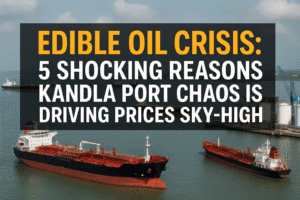Edible Oil Crisis: 5 Shocking Reasons Kandla Port Chaos Is Driving Prices Sky-High
Severe congestion at India’s vital Kandla port is paralyzing edible oil imports, risking shortages and price spikes nationwide. As the primary gateway for palm oil supplying northern and western refineries, eight ships carrying 157,000 tonnes remain stranded offshore, with five more vessels imminent. Port authorities cite a surge in arrivals after recent import duty cuts, leading to 8-10 day delays that traders warn could extend to 20 days.
Critically, the chaotic practice of removing vessels mid-discharge worsens bottlenecks and inflates costs through massive demurrage fees. These delays directly threaten timely supplies to local markets, amplifying existing volatility in global palm oil prices. The crisis starkly exposes India’s strained port infrastructure, unable to efficiently handle policy-driven import surges. Beyond immediate operational fixes, experts urgently call for significant port modernization and smarter logistics systems to secure essential food supply chains. Failure to address these systemic weaknesses risks recurring disruptions impacting both market stability and household budgets.

The Scale of the Problem:
- Stranded Cargo: As of mid-June, 8 vessels carrying 157,000 tonnes of edible oil (primarily Indonesian CPO) are anchored, waiting for berths. Only 2 vessels are actively unloading.
- Incoming Wave: 5 more vessels carrying 159,000 tonnes are expected within the next week, exacerbating the crisis.
- Growing Delays: Average waiting times are currently 8-10 days. The Solvent Extractors’ Association of India (SEA) warns this could balloon to 15-20 days, severely disrupting supply.
- Operational Chaos: Critically, the SEA reports Kandla Port has resorted to pulling vessels mid-discharge (with only 1,000-3,000 tonnes left) to make way for others, incurring massive additional delays and costs due to port re-entry rules.
Why Kandla Matters: Kandla isn’t just any port. It’s the primary artery supplying major refineries serving the densely populated western and northern regions of India – the heartland of the country’s edible oil consumption. As the world’s largest importer of palm oil (averaging 750,000 tonnes monthly), efficient operations here are non-negotiable for market stability.
Root Causes of the Gridlock:
- Policy-Induced Surge: Deendayal Port Authority (DPA) Chairman Sushil Kumar Singh directly attributes the congestion to a “sudden surge in edible oil vessel arrivals” following the Indian government’s reduction of import duties in May 2025. This policy shift triggered a rapid influx of shipments.
- Inadequate Infrastructure: The surge has overwhelmed Kandla’s existing cargo handling capacity and berth availability. The port lacks the necessary buffer to handle such sharp, policy-driven spikes efficiently.
- Cascading Operational Failures: The practice of removing vessels mid-discharge, while intended to free berths, backfires spectacularly. It traps vessels in a costly limbo (3-5 days minimum for re-berthing) while accruing demurrage charges and failing to solve the underlying capacity issue.
The Mounting Human and Economic Toll:
- Market Shortages: Delays directly translate to slower replenishment of refineries and downstream distributors. The SEA explicitly warns this congestion “could lead to a scarcity of edible oil in the local market.”
- Soaring Costs: Demurrage charges (fines for delayed unloading) are skyrocketing. These costs are inevitably passed along the supply chain, ultimately inflating prices for consumers already facing volatility.
- Price Volatility Amplified: This crisis hits amid sharp fluctuations in global palm oil prices, driven by factors like proposed US biofuel mandates. Kandla’s delays add a disruptive, localized layer of uncertainty and cost pressure to this volatile market.
Beyond Quick Fixes: The Call for Systemic Solutions:
Industry experts emphasize that reactive measures are insufficient. Jitendra Srivastava, CEO of Triton Logistics & Maritime, highlights the urgent need for:
- Infrastructure Modernization: Upgrading berths, expanding container terminals, and developing adequate warehousing near ports.
- Operational Intelligence: Implementing predictive analytics for better vessel traffic management and enhanced coordination between port authorities, customs, and logistics providers.
- Technology Adoption: Automation in cargo handling and streamlined documentation processes to accelerate turnaround times.
- Long-Term Planning: Ports nationwide must proactively scale capacity and efficiency to match India’s growing trade volumes, not just react to crises.
Kandla’s congestion is more than a temporary backlog; it’s a stark symptom of strained infrastructure colliding with policy shifts and surging demand. While the immediate risk is edible oil shortages and higher prices in key Indian regions, the deeper lesson is clear. Ensuring India’s food security and price stability for staples like edible oil demands urgent, significant investment in port modernization and smarter logistics systems. The cost of inaction – measured in empty shelves and strained household budgets – is simply too high. The clock is ticking for both port authorities and policymakers to deliver sustainable solutions.
You must be logged in to post a comment.